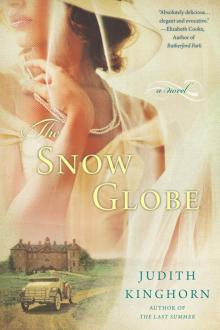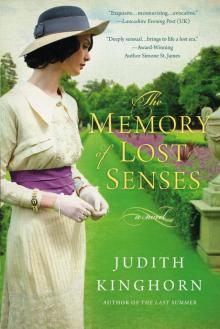- Home
- Judith Kinghorn
The Echo of Twilight Page 7
The Echo of Twilight Read online
Page 7
“I married my husband when I was eighteen years old, shortly after I came out. It was what was expected,” Ottoline began. “I was a child. I had no idea about men, or love or marriage. But Hector Campbell was dashing, and attentive . . . And most important to my mother, he rode beautifully, and most important to my father, he had money—lots of money.” She paused for a moment. “After our marriage, I did fall in love, genuinely fall in love . . . But I’ve been married for over twenty years, and for most of that time, my husband’s enjoyed a succession of mistresses.” She paused and glanced over to the open window. “I have, I think, been a dutiful wife. I’ve given him his sons . . . an heir and a spare. I run his homes—our homes; I play my part. But my husband has always preferred to share himself with others, and I accepted that a long, long time ago. I had to . . . For these past two years or so it’s been Virginia . . . And it’ll be another, one day.”
A shaft of sunlight fell on her, picking out the fine strands of silver in her dark hair, and as she lowered her head and looked downward, she appeared every one of her years, and nothing like the woman who had interviewed me in London.
She sighed. “I’m not sure what my husband and I have in common anymore. The only thing I’m certain of is our love for our boys. We’re a family,” she added, raising her eyes to me. “Family,” she repeated.
I was relieved at hearing this word, her emphasis upon it, and I hoped we were about to paddle back to safer waters; that she’d tell me she really did love her husband and that she knew he loved her, and that what I’d witnessed that morning was a momentary slip, nothing more.
“It’s taken me some time to forget about duty and allow myself the same freedom as men like my husband. It’s taken me some time to allow myself to be loved . . . And the man you saw in my bed this morning? Well, he loves me—and loves me in a way I understand and need.” She shrugged, and then she finally smiled. “He loves me,” she said again, clearly relishing the sound of those three words.
But for some inexplicable reason my own heart sank.
And yet Ottoline deserved to be loved. Everyone did. And how could I damn her for her infidelity to a man who had abused her trust for so many years?
And she must have seen something in my expression, because she said, “Please don’t be sad. Our lives are what we make them, and more and more as I get older, I realize this. We must all grab every chance for happiness with both hands, Pearl. Carpe diem,” she said, reminding me of Stanley’s carpey-dee-um. “Seize the day . . . Seize every day and every precious moment. We must. Particularly now.”
Particularly now . . .
All day, Ottoline’s words about grabbing happiness and seizing moments went round and round in my head. There I was in Scotland, another country, when we were about to go to war, when the man I planned to spend my life with was hundreds of miles away in London. All day, I pondered the complexities of marriage and the extraordinary muddles people got themselves into when there really was no need: Ottoline should have been with her husband at a time like this, not with Ralph Stedman; Lord Hector should have been with Ottoline—and not with Virginia Parker. And I should have been back in the South with my Stanley and not dancing about lawns and telling lies to a painter in a skirt.
All day, my thoughts clashed and simmered. All day, images sprang up in my mind. I saw Ottoline intentionally drop a towel to the floor, her dark hair stretching all the way down to her buttocks as she wandered about, as Ralph Stedman lay back on a bed, transfixed, his eyes fiercer than ever. And all day, bells rang out, announcing yet another telegram.
Though I still wasn’t sure of His Lordship’s role at the Foreign Office, I knew he must be important. For as isolated as we were, and whatever his role, it and he kept us up-to-date on unfolding events and news from London. And news traveled fast: The British fleet had been mobilized.
That evening, Mr. Watts led us in special prayers at supper. And when he said, “God guard us and keep our great country safe and free,” we repeated it in loud unison. Later, I returned to the servants’ hall—with paper and pen, and the intention of writing another letter to Stanley. I couldn’t very well do this in my room, not by the light from a single candle, but the hall was well lit by oil lamps and, though we were rather awash with lady’s maids and valets, I thought it would be quiet by then. But it wasn’t. Mr. Watts was patrolling the passageways, and Charles, Lord Hector’s valet and Mrs. Parker’s maid remained seated in the servants’ hall.
As was the usual custom, we knew our guest lady’s maids and valets only by the names of those they served. And I had learned earlier, at supper, that Parker was more loquacious than the others. That evening, late as it was, Parker was still in full flow, waving about an amber cigarette holder with a great length of ash arcing at its end, and talking about Mr. Asquith and what he might or might not do, as though she knew him intimately. But as I pulled up a chair, placed my writing pad and pen down on the table, she stopped. “Writing home, are we?” she said, stubbing out her cigarette.
“To my fiancé.”
“Ah, and where’s he?”
“London.”
“In service?”
“He works at the Café Royal.”
“I know it well. What does he do there? I might have met him.”
I didn’t want to tell her. I said, “He’s in management.”
Parker widened her eyes, folded her arms: “I say, a fiancé in management. You’ll be all right, then.”
I smiled.
“So, what do you make of it?” she asked, quieter now and leaning toward me.
“I hope Germany will see sense.”
She laughed. “I don’t mean that. I mean the carrying on upstairs,” she whispered.
“Parker,” said Charles, smiling and a little too flirtatious to be serious, I thought.
“Forgive me if I’m speaking out of turn. I just wondered if it was the same at your last place.”
“Oh no, I was with an elderly widow before I came here.”
“Ha, old age doesn’t always stop them,” said Parker.
I tried to smile. I said, “Have you been with Mrs. Parker long?”
“Two years—and ready for a change as well. I suppose if you’re going to be in service, it’s a nice enough job, not too onerous, but I fancy something different.”
“Like what?”
“Shop work, perhaps. Oh, I don’t mean any old shop. I’m not planning to stand at the cash till in an ironmongers,” she added, and laughed. “No, one of the London department stores, and ladies’ fashions, I thought. They snap up people like us, lady’s maids—who know how to sew and are familiar with the French fashions.” She propped her head in her hands and stared back at me over the table. “What about you? Are you enjoying looking after Lady Ottoline?”
I nodded. “But it’s still early days and I’ve a lot to learn.”
“Hmm, I bet you’ve already learned who your lady prefers in her bed, though.”
I said nothing. Charles winked an eye at me, then pushed back his chair and rose to his feet. “Time I went to bed . . . Good night, ladies.”
Parker waited until Charles had left the room, then said, “I’m sorry. I didn’t mean to be disrespectful about Her Ladyship . . . It’s just, well, I happen to know things.”
I smiled. “Yes, and so do I.”
“Really?”
I nodded. “They’re in love.”
Parker rolled her eyes.
“He loves her,” I said.
She stared at me. “I’m not so sure about that.” She leaned over the table, and so I moved in, too. “He has someone else . . . In London . . . Considerably younger than Lady Ottoline . . . Everyone knows.”
I stared back at her. “Idle gossip.”
She shook her head. “No, not idle gossip. I’ve seen for myself.”
I closed my eyes.<
br />
“I’m sorry. But best I tell you—especially as you’ll be the one who has to pick up the pieces.”
“Cad.”
“Utter.”
“He told her he loved her.”
“Complete liar.”
“Despicable.”
“I’ll say.”
“And you know, I met him in London?”
“No!”
I nodded: “He carried my suitcase onto the train for me.”
“Ha, narrow escape, I’d say.”
At that moment came the sound of keys jangling in the passageway, a shuffling on the other side of the door. We locked eyes.
“Still up?” said Mr. Watts, peering into the room. “You know it’s after midnight?”
“I was just saying good night,” said Parker.
“And probably a very good idea . . . I’ve a feeling you might have an early start.”
She smiled at me. “I’m pleased we had our little chat.”
Dear Stanley,
I hope you are well. I am a little concerned to have heard nothing from you, but perhaps you did not receive my first letter—giving you the address in Northumberland? I know you must have my address here in Scotland, as I wrote to you twice before we came away.
We arrived here on Saturday & though I had no sleep at all on the journey & was very tired for the first day or so, I am well. I am also going to have quite a few tales to tell when I see you & am saving them all up—so be warned!
We are, it has to be said, quite isolated here, but there have been many telegrams to His Lordship—who is, I believe, quite important at The Foreign Office—and Mr. Watts (the butler) gives us bulletins each day. According to Mr. W., His Lordship thinks war is inevitable, and so everyone is understandably anxious & though I’m not sure what will happen, whether we will stay here for the full duration, all the boys—including Lady O.’s sons—say they’ll sign up (Mr. W. reckons this is just young and foolish patriotism). I do hope you are not thinking the same? In fact, I would be grateful for a letter by return to reassure me of that.
Anyway, the main thing I want to tell you is that I have decided to give notice, and for reasons I do not wish to go into in this letter. As I say, I will explain all when I see you. I intend to wait until we are back in Northumberland to give formal notice. I’ve come to know Her Ladyship quite well & won’t leave her until she has found my replacement. I need a good character—particularly after such a short time. But it’ll mean I’ll be in London, near you, & so I hope this pleases you.
Do write soon.
Fondest wishes,
Pearl
Chapter Seven
My maternal grandfather, Henry Gibson, was a blacksmith—like his father before him. He had a workshop and yard not far from the river, near St. Mary’s Church in Battersea, which is where he married his sweetheart, Kate, and where each of their children was baptized, and later buried. Henry and Kate lost three sons in infancy and a daughter at five. By the time their youngest—my mother—walked into the Thames, Kate had already joined her children in the churchyard. My grandfather, Henry, passed away when I was seven, and his sister, Kitty, ten years later. She never saw me become a lady’s maid.
The strange thing about my ambition to become a lady’s maid was that, at the same time it happened—I don’t really count my position with Mrs. B.—other things began to occur. Things almost in direct contradiction with everything I had previously thought. You see, I’d begun reading the newspaper, had started to think bigger than the counties of England.
I had been in service from the age of fifteen; an inquiring mind was not something that had been encouraged. But starting in Northumberland and continuing in Scotland, my desire for education, an ever-increasing thirst for knowledge, seemed to know no bounds. I wanted to know the history of the Balkans, know and understand what was happening there and how it affected the country in which I’d been born. I wanted to know about empires; not just the British Empire, but the Ottoman Empire, the French Empire, the Russian Empire—every empire there was or ever had been. And I wanted to know why the Prussian War had left so much undone; where Alsace-Lorraine was situated and what had actually taken place at Versailles.
But as Kitty used to say, learning is a dangerous thing, and everything I learned created only more questions—questions I wouldn’t and couldn’t have imagined months before. And it all made me realize how little I knew, how much I would never know, and it frightened me.
War seemed as unavoidable as the desperate forward motion of my mind. My heart was heavy with dread at the prospect of change—imminent change. So much so that I wanted to run back to Stanley, the sole representative of what I had been and knew. Confronted with uncertainty, I longed for familiarity, and in the absence of all others, it came in his shape.
Each morning at around nine o’clock, the outbound post was collected from the polished mahogany and brass box in the main hallway, and the inbound post delivered and distributed. That morning, on the mantelshelf in the servants’ hall, was a picture postcard cheerily proclaiming “Greetings from Scarborough.” I glanced over at Mrs. Lister before picking it up. Dear Rodney, I thought this might bring back some happy memories. Saw Derek yesterday and we had tea at the Grand. He says he intends to sign up. Can you please write to him? Fingers crossed for the sixteenth. It was signed, Love, Ethel, and addressed to Mr. R. Watts.
It was only when I put down the postcard that I saw the small brown envelope addressed to me. I recognized the hand immediately and didn’t think to take it to my room.
“That’s funny,” I said to Mrs. Lister as I sat down. “Here’s a letter from my fiancé, and I’ve only just posted one to him.”
“Well I never. I had no idea you were engaged to be married.”
“Oh, well, it’s not official. Not yet. It’s . . . It’s sort of secret, you see.”
Mrs. Lister tapped her nose with her finger. “I won’t say a thing. But it’s lovely news and lovely that you’re both thinking of each other—and understandably so at a time like this.”
The envelope contained only one sheet of paper, one paragraph.
Dear Pearl,
This is not an easy letter for me to write. I have given much thought to our present circumstances & future, and if you had stayed in the South, I might have thought differently. But your decision to go North made me think, and now that it looks like there will be a War, I intend to sign up at the first opportunity & do my Duty. Bearing in mind we didn’t get to see much of each other anyway, and now with you up there & me down here—or even soon in France—there seems little point in us continuing. Suffice to say I feel I must end our liaison. I am very sorry and hope you won’t be too sad. Plenty more fish in the sea, as they say.
Take care of yourself.
Best wishes,
Stanley
“Not bad news, I hope?” said Mrs. Lister, scrutinizing me.
I folded the page, put it back inside the envelope. “No, just a note for now.”
Mrs. Lister winked at me. “The course of love never did run smooth,” she said, laughing. “But don’t worry, I won’t ask what he said.”
Plenty more fish in the sea . . . The cheek of it, I thought. But inside my head I heard the sea—the same gushing sound you hear when you put a shell to your ear. I rose to my feet and, clutching the letter in my hand and trying not to run, I went to the main hallway. But the postbox was empty, the letters all gone—including mine to Stanley. So I returned to the kitchen and waited until Mrs. Lister had gone to the larder before I opened the door of the range and threw in Stanley’s letter. Then I closed the iron door and walked out of the house.
It was my own fault, I thought, as I fought back tears and headed down the driveway toward the old stone bridge and the river, that I had lost my suitor—my only suitor. I had been stubborn and selfish, trying to be the superior sort
of girl Kitty wanted me to be—the lady’s maid.
If I had stayed in the South, seen him more, gone to the pictures with him . . . If I had just been prepared to . . . to offer a little more of myself . . .
“Everything’s about sex,” I muttered, angry again as I clambered down the bank by the wall of the bridge. I hobbled across the washed-up stones and rocks and sat down on a large boulder near the water’s edge. The sun was already high in the sky, the stone’s surface smooth and warm beneath me. And though I knew—knew even then—that Stanley Morton wasn’t worth my tears, at that moment a desperate longing, a longing I’d known all of my life, the desire to belong to someone or something, to have a home, a family, swamped me.
I didn’t hear anyone approach. I felt a hand on my shoulder—a touch; that was all. Then I heard my name and I knew.
“Why so sad?” he asked, lowering himself and staring at me.
I shook my head, unable to summon any words. The only thing I knew for certain at that moment was that the world was bigger and far more dangerous than I’d ever realized, and I’d been abandoned, again.
“Is it all this talk of war?”
I didn’t say anything, couldn’t.
“Is it Delnasay?” he asked. “You know, you don’t have to stay here if you’re miserable and unhappy . . . I know Ottoline wouldn’t want that. And I can speak to her, explain to her that you wish to go home.”
Home . . .
He passed me his handkerchief, folded, freshly laundered. And as I took it from his hand, I heard someone call out in the distance; I turned in the direction of the house and then looked back to him.
“The boys,” he said, staring back at me, frowning and smiling at the same time. “I’m supposed to be leading them on a hike, but I can’t leave you here like this.”

 The Snow Globe
The Snow Globe The Echo of Twilight
The Echo of Twilight The Last Summer
The Last Summer The Memory of Lost Senses
The Memory of Lost Senses